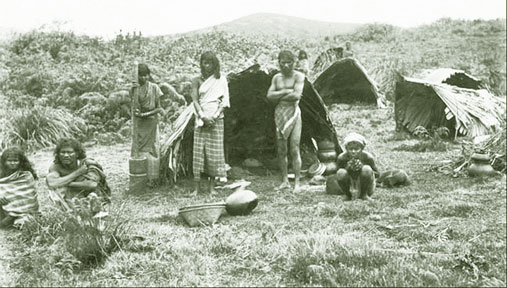Ahikuntaka community, people with untold aspirations
By Amal Hewavissenti
During my childhood, I immensely enjoyed the comic strip Sathweni
Dawasa (created by Bandula Harishchandra and Published in the Silumina)
which presented a dissection of gypsy life and their tragedies in the
face of rapid social change. In this popular strip cartoon, the gypsies
(Ahikuntakas) were pictured as tragic heroes in the process of evolution
and in their struggle to avoid being sidelined in society.
The subsequent cinematic work based on this comic strip redoubled the
appeal of the original story which strongly implies that Ahikuntakas,
confronted by the onset of rapid development are unable to find a way to
fit in with the rest of society. In total contrast, today they no longer
reside in traditional tents as they had done for centuries.
 |
|
Sri Lankan Ahikuntikas |
They have gradually assimilated into the life style of the general
population and live in permanent dwellings practising various trades and
vocations. Their unorthodox lifestyle include shifting to a new camping
ground every seven days (Sathweni Dawasa) and engaging in vocations such
as fortune telling, taming monkeys for performing tricks and snake
charming.
Now it is often interesting to find them working as labourers,
tailors, soldiers and small-scale businessmen in buses.
But they seem to be fighting a losing battle to enhance their social
standards, and to revive their vanishing culture and tradition.
Gypsies who are a minority community gradually disappearing in Sri
Lanka establish a unique identity as a people who live in tents, wander
from place to place and earn basic living by palm reading, snake
charming and training monkeys for entertainment purposes.
Tribal
Historically, Sri Lankan gypsies trace their origin from a primitive
tribal group who had immigrated to Sri Lanka from Andra Pradesh. They
are probably the descendants from wondering tribesmen called "Koravar"
who still continue their vagrancy in provinces of Kerala, Madura and
Pandya.
Apart from speaking their vernacular language 'Teligu', they are
equally conversant in Sinhala and Tamil as they are the major lingo in
the society they live in.
A march of gypsies is generally characterised by donkeys, trained
monkeys, hounds, people carrying reed boxes with poisonous snakes in
them and ladies wearing colourful garments and carrying children in
cloth bags. Interestingly enough, these people save nothing for future,
build no house for permanent residence but centre their whole life on
monkeys, fortune telling, snake charming and something hunting.
The gypsy community live scattered in many parts of the country and
have succeeded in preserving their social characteristics. They are
mostly seen engaging in their trades and vocations in areas such as
Galgamuwa, Anuradhapura, Moratuwa and Puttalam. Traditionally, the most
wealthy, intelligent, fair and dignified persons in the tribe is
frequently chosen as the leader or the chief in the group.
"Korala" and "Vidanearachchi" are other responsible positions in
gypsy tradition which are formally conferred on the most intelligent and
experienced members of Ahikuntaka tribe according to the ideals and
ethics of the tribe. Quite naturally, the customs and traditions of
Ahikuntaka community strongly underpin allegiance to the leadership.
The Ahikuntaka community is well bound up by a texture of religious
beliefs formulated from multiple faiths. God Shiva is their Chief God
and all their religious rituals centred around Hinduism. Apart from
that, Gypsies have strong faith in Buddhasami (Buddha), Ayyanayaka,
Vishnu and Skandha Kumara.
Sri Lankan gypsies (Ahikuntikas) are compelled to engage in daily
labour to sustain themselves owing to the current economic pressures.
It is sometimes difficult to distinguish between Ahikuntakas and
other Sinhala counterparts as they share similar names. However, the
traditional gypsy names are Agatanna, Vannaku, Anavattu, Rengasami,
Thangamma, Lechchami and Mangamma.
Lifestyle
Most Ahikuntika children are tempted to obtain a higher education and
shed their traditional lifestyle in order to become accepted into the
society they live.
A historic event on the part of gypsy community in Sri Lanka took
place upon the banks of Rajanganaya tank in Thambuttegama on January 28,
2011. A "Varigasabha" (a tribal meeting) was held there with all the
gypsies and their leaders brought together from all over the country to
one place.
At this tribal meeting, the Ahikuntaka leaders came together and
discussed the core issues and the ways and means to address them. An
elaborate cultural ceremony that commenced with flute playing and a
traditional dance by the women. The tribal leaders exploited this
Varigasabha to talk of their lives, changing times and concerns that
affect their very existence.
For the first time in the history of minority communities, a special
charter for the Ahikuntaka community was adopted to upgrade their unity
and to strengthen their cultural identity.
The Varigasabha held in 2011, introduced "Kudagama Charter for Sri
Lanka Gypsy community" and five community leaders representing the gypsy
communities endorsed it formally.
At this tribal meeting, Ahikuntaka youth expressed their views and
attitudes regarding their culture and trends. It is important to note
that the aspirations of youth are critically different to those of their
elders and they recognise a dramatic change in their life styles in
order to be part of the greater society they live in.
The Ahikuntaka youth are much enthusiastic to progress beyond the old
generation and to shed their traditional livelihood methods.
At the same time they develop a trend to conceal out the stigma of
alcoholism that is often related to the gypsy community.
While the elders strictly stick to the traditional values, the youth
directly aspire to be educated, to be employed in recognised
institutions and to provide systematic education to their children in
government schools.
The youth are also of the view that they are incapable of convincing
their parents of the urgency to change their lifestyles in order to be
"in".
A greater effort to alter and enhance public perception regarding the
gypsy community and to upgrade their living conditions, is the need of
the day.
|


